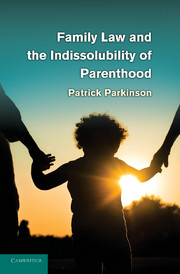Book contents
- Frontmatter
- Contents
- Preface
- PART ONE Family Law and the Meaning of Divorce
- PART TWO Parenthood in the Enduring Family
- PART THREE Parents Forever?
- PART FOUR The Family Law System and the Enduring Family
- PART FIVE Financial Transfers in the Enduring Family
- 10 Child Support and the Obligations of Parenthood
- 11 Spousal Support and the Feminization of Poverty
- PART SIX The Future of Family Law
- Index
- References
11 - Spousal Support and the Feminization of Poverty
Published online by Cambridge University Press: 01 March 2011
- Frontmatter
- Contents
- Preface
- PART ONE Family Law and the Meaning of Divorce
- PART TWO Parenthood in the Enduring Family
- PART THREE Parents Forever?
- PART FOUR The Family Law System and the Enduring Family
- PART FIVE Financial Transfers in the Enduring Family
- 10 Child Support and the Obligations of Parenthood
- 11 Spousal Support and the Feminization of Poverty
- PART SIX The Future of Family Law
- Index
- References
Summary
One of the major consequences of the divorce revolution and the rapid growth of unmarried parenthood has been the increased feminization of poverty, particularly for women, with children, who do not repartner. The focus of attention around the world has been on child support, but there has also been a revival of attention given to spousal support, in some jurisdictions at least. This is seen as another means of addressing the problem of women's economic vulnerability following relationship breakdown.
THE DIVORCE REVOLUTION AND THE CLEAN BREAK
As noted in Chapter 2, an important feature of the divorce revolution was the idea that, as far as possible, a clean break should be achieved financially between the parents through a once-for-all property division, with child support being the only obligation that continued, where awarded. Each party to the failed marriage was to be encouraged to put the past behind them and offered the opportunity to begin a new life - one not overshadowed by the relationship that had broken down.
The practical outworking of this, in many jurisdictions at least, was that spousal support – otherwise known as alimony – was not to be a normal and commonplace incident of postseparation relationships. As much as possible, each party was to be encouraged to stand on his or her own feet, free of ongoing financial commitments to each other.
- Type
- Chapter
- Information
- Family Law and the Indissolubility of Parenthood , pp. 238 - 266Publisher: Cambridge University PressPrint publication year: 2011

